 Petzlover
Petzlover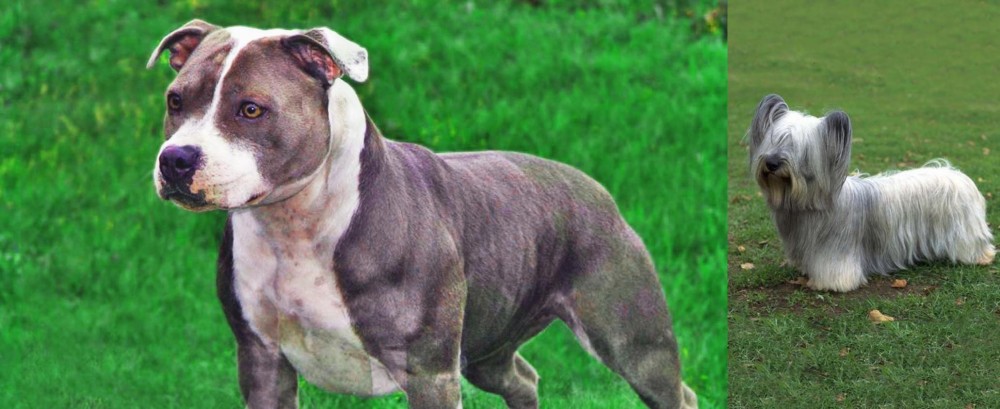 Irish Staffordshire Bull Terrier is originated from Ireland but Skye Terrier is originated from United Kingdom. Irish Staffordshire Bull Terrier may grow 22 cm / 9 inches higher than Skye Terrier. Both Irish Staffordshire Bull Terrier and Skye Terrier are of same weight. Both Irish Staffordshire Bull Terrier and Skye Terrier has almost same life span. Both Irish Staffordshire Bull Terrier and Skye Terrier has almost same litter size. Irish Staffordshire Bull Terrier requires Low Maintenance. But Skye Terrier requires Moderate Maintenance
Irish Staffordshire Bull Terrier is originated from Ireland but Skye Terrier is originated from United Kingdom. Irish Staffordshire Bull Terrier may grow 22 cm / 9 inches higher than Skye Terrier. Both Irish Staffordshire Bull Terrier and Skye Terrier are of same weight. Both Irish Staffordshire Bull Terrier and Skye Terrier has almost same life span. Both Irish Staffordshire Bull Terrier and Skye Terrier has almost same litter size. Irish Staffordshire Bull Terrier requires Low Maintenance. But Skye Terrier requires Moderate Maintenance
 The Staffordshire Bull Terrier comes from Staffordshire, England, but the Irish Staffie was later developed by Irish breeders so its origin is essentially Ireland. They were developed from bulldogs and different terrier breeds.
The Staffordshire Bull Terrier comes from Staffordshire, England, but the Irish Staffie was later developed by Irish breeders so its origin is essentially Ireland. They were developed from bulldogs and different terrier breeds.
The dog was always used for bull baiting, but when this sport died out, the Irish breeders wanted to create a taller, leaner dog suited for dog fighting. When dog fighting was banned the breed became rare again, but today it has been restored and is essentially a popular companion pet.
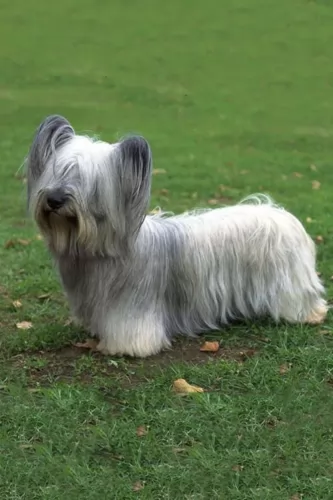 The Skye Terrier is a hardy dog breed and is actually considered to be an endangered native dog breed in the United Kingdom.
The Skye Terrier is a hardy dog breed and is actually considered to be an endangered native dog breed in the United Kingdom.
They were found on the Isle of Skye, although there is some confusion about its history. They were used long ago to hunt but these days they are essentially companion dogs.
They found their way to America and the Skye Terrier Club of America was founded in 1938. The American Kennel Club recognized the breed in 1887.
 The Irish Staffordshire Bull Terrier is a medium sized pure-breed dog standing at roughly 43 to 48cm and weighing anything from 14 to 18kg.
The Irish Staffordshire Bull Terrier is a medium sized pure-breed dog standing at roughly 43 to 48cm and weighing anything from 14 to 18kg.
He has a short, smooth coat which can be a mix of colors such as fawn, tan, black or brindle. The coat can also be bi-colored such as in fawn and white or black and white. He is a powerfully built dog with short legs which are fairly wide apart.
He has a large head and short muzzle with powerful jaws.Sometimes when he pants after a hectic bout of exercise he gets a comical, grinning look on his face. The ears are semi-erect, semi-upright and he has a long tail.
Your Irish Staffy is a feisty, confident dog that has been known to have a temperament which leads towards aggression. It is why he should be trained and socialized to make him more amicable and obedient. He is an intelligent and alert dog, so won't have difficulty with training.
A well trained and socialized Irish Staffordshire Bull Terrier will get on well with children in the home as he is a playful, jovial dog, always ready for a game.
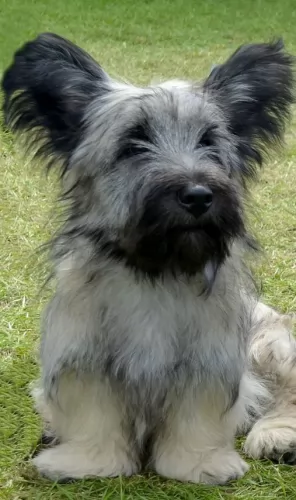 The Skye Terrier is a medium-sized dog standing at between 23 and 26cm in height and weighing between 12 and 18kg. The legs are short and sturdy. He is double coated with the top coat being straight and hard and forming a beard around the face area. The coat can be fawn, and in various shades of grey which are sometimes even black. The ears of the dog are medium sized and erect.
The Skye Terrier is a medium-sized dog standing at between 23 and 26cm in height and weighing between 12 and 18kg. The legs are short and sturdy. He is double coated with the top coat being straight and hard and forming a beard around the face area. The coat can be fawn, and in various shades of grey which are sometimes even black. The ears of the dog are medium sized and erect.
The Skye Terrier has always been a hunting dog and he enjoys quite a bit of exercise – walks, ball games as well as indoor games. Small though he may be, he is strong willed with a mind of his own and will benefit from being trained and socialized.
This is also necessary as he has a fairly reserved nature. He gets on well with children and makes an excellent family pet but he is ready to take on smaller pets in the home. He will bark when confronting strangers and makes an excellent watchdog too.
He is able to adapt well into life in the city or the countryside. He isn’t a dog to be left outside day after day and will just die of boredom, frustration and loneliness.
 The older Irish Staffie has always been an aggressive type dog used for fighting, but today the modern breed is capable of being a splendid, entertaining, amicable pet with an even temper. He is feisty for sure, being brave, fearless, loyal and loving with his human family members.
The older Irish Staffie has always been an aggressive type dog used for fighting, but today the modern breed is capable of being a splendid, entertaining, amicable pet with an even temper. He is feisty for sure, being brave, fearless, loyal and loving with his human family members.
All it requires with this dog is to have a firm, loving upbringing, some training and socialization as well as good food and plenty of love and attention. Many dogs get labelled wrongly because of the humans that rear them the wrong way. When done correctly, the Irish Staffordshire Bull Terrier promises to be a wonderful, loving, loyal pet.
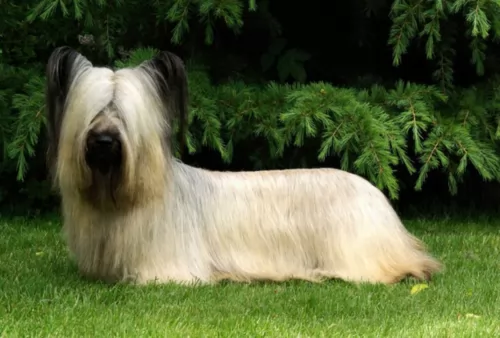 Give the Skye Terrier the attention he wants and he will reward you with his loving companionship.
Give the Skye Terrier the attention he wants and he will reward you with his loving companionship.
He loves the entire family but is best suited to homes where children have been taught to be kind to animals and to treat them with respect.
He has moderate energy levels and will expect you to give him a fair amount of exercise. The Skye Terrier can make an excellent companion for you and your family.
 The Irish Staffordshire Bull Terrier, just like with any other dog, has a good chance of living a good number of years if he is fed properly. He can live to be anything up to between 10 and 16 years.
The Irish Staffordshire Bull Terrier, just like with any other dog, has a good chance of living a good number of years if he is fed properly. He can live to be anything up to between 10 and 16 years.
Say what you like, good nutrition and the lifestyle you provide for your Irish Staffie will determine how long he lives. An unhappy dog that has to beg for love and attention won't do well. Your Irish Staffie can live to a ripe age but he is still at risk for certain health problems.
These mast cell tumors are graded according to their location in the skin. Certain dogs like Boxers and bulldogs are more susceptible to mast cell tumors than other breeds, and the Irish Staffie isn't immune either. Most times the tumor develops in an older dog, though young dogs have also been known to develop the tumor. These tumors can be inactive for a while and then experience some rapid growth with some redness and fluid build up. Immediate veterinary intervention will be required.
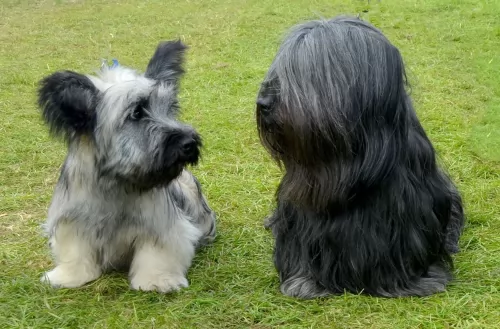 The Skye Terrier is a healthy dog breed. Perhaps the only issue that could be a problem with him is orthopedic problems. He is an achondroplastic dog, meaning a large body on small legs.
The Skye Terrier is a healthy dog breed. Perhaps the only issue that could be a problem with him is orthopedic problems. He is an achondroplastic dog, meaning a large body on small legs.
He could develop spinal problems if he were allowed to constantly be jumping off beds and high chairs.
Orthopedic problems affect the bones, muscles and joints and can actually be debilitating. Orthopedic conditions can be ligament tears or hip dysplasia for instance, accompanied by arthritis.
You’ll notice your dog has an abnormal way of walking or running, inability to get up once lying down and he may have arthritis and pain.Be careful because obesity can trigger problems with the joints and bones.
 The Irish Staffie is an active dog, who is always game for anything. He will certainly need active owners who include him in all their activities. He has a lot of stamina and endurance and will want to join you on your walks, hikes and swimming. Ignoring his exercise needs can turn him into a restless, unhappy, frustrated, destructive dog.
The Irish Staffie is an active dog, who is always game for anything. He will certainly need active owners who include him in all their activities. He has a lot of stamina and endurance and will want to join you on your walks, hikes and swimming. Ignoring his exercise needs can turn him into a restless, unhappy, frustrated, destructive dog.
Having a short, smooth coat means your Irish Staffie being a low maintenance dog. He does shed a bit so his coat will need to be brushed at least twice a week to get rid of all those loose hairs. Its always a good opportunity to check him for fleas and ticks too.
If the short coat gets too dirty, a wipe down with a damp cloth can keep the coat bright and shiny. Certainly avoid bathing him too often as this can aggravate the skin.
Check his nails and trim them if they get too long. Check his ears and teeth as these are all problem areas which can contribute to your dog becoming ill.
Your Irish Staffie is such an energetic dog that he will need excellent food that promotes this energy. Whether you buy him the best commercially manufactured kibble, you want to also add in some home-made food such as cooked chicken, rice and vegetables as well as including some raw meat occasionally. The food you provide your Staffie with needs to be full of vitamins and minerals to avoid illness. Always make sure he has access to fresh, cool water.
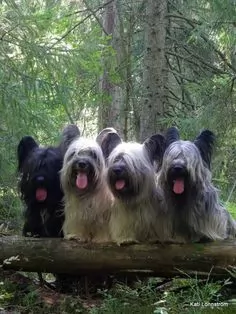 ● The coat of the Skye Terrier is long and silky and will most certainly require brushing every day if you keep the hair long. Such silky hair can easily become matted.
● The coat of the Skye Terrier is long and silky and will most certainly require brushing every day if you keep the hair long. Such silky hair can easily become matted.
● Little dogs like this will need their teeth being checked regularly. You can even try to buy special pet toothpaste and toothbrush and brush his teeth yourself. If you prefer, a professional dog groomer can do this for you and at the same time trim his nails and check his ears and clean the insides of the ears too to avoid infection.
● Provide him with top quality food as the quality of the dog food you buy makes a huge difference to his health and longevity. He is a small dog and there are some excellent commercially manufactured dog foods specially made for small, energetic dogs.
Try to include some home-made food for him which can be simply mixed into the dry kibble twice a week. Boiled chicken, brown rice or pasta and spinach, sweet potatoes and carrots is super tasty and nutritious. Ensure there is always a bowl of fresh, cool water within his reach.
● Keep his vaccines up to date against some deadly canine diseases, and get him to the vet when he shows signs of illness.